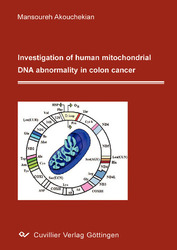| Departments | |
|---|---|
| Book Series (97) |
1381
|
| Nachhaltigkeit |
3
|
| Gesundheitswesen |
1
|
| Humanities |
2370
|
| Natural Sciences |
5407
|
| Mathematics | 228 |
| Informatics | 319 |
| Physics | 980 |
| Chemistry | 1364 |
| Geosciences | 131 |
| Human medicine | 243 |
| Stomatology | 10 |
| Veterinary medicine | 108 |
| Pharmacy | 147 |
| Biology | 835 |
| Biochemistry, molecular biology, gene technology | 121 |
| Biophysics | 25 |
| Domestic and nutritional science | 45 |
| Agricultural science | 1005 |
| Forest science | 201 |
| Horticultural science | 20 |
| Environmental research, ecology and landscape conservation | 148 |
| Engineering |
1798
|
| Common |
98
|
|
Leitlinien Unfallchirurgie
5. Auflage bestellen |
|
Advanced Search
Investigation of human mitochondrial DNA abnormality in colon cancer (English shop)
Mansoureh Akouchekian (Author)Preview
Table of Contents, Datei (31 KB)
Extract, Datei (78 KB)
The appearance of mtDNA abnormalities including deletions, duplications,
insertions or combinations of them in colorectal cancer (CRC) patients was
investigated in this work. Our result showed that 11 of 90 CRC patients had a 8.7
kb mtDNA deletion (12.2%) while this deletion was not found in 33 healthy
controls. (P=0.035)
We conclude that the 8.7 kb deletion can be a secondary effect of the cancer
process, which is not inherited. This is the first report on large scale deletions in
CRC.
We also analyzed the correlation between cancers and mitochondrial haplogroups.
The relationship between CRC and each of 9 major mitochondrial haplogroups
were examined in Iranian CRC patients. This is the first study to trace mtDNA
HVSI variants in CRC patients of the Persian population. Our data showed that
patients with CRC have a significantly (P=0.001) higher frequency of haplogroup
K (9.5%) when compared with controls (0%). The mitochondrial polymorphisms
in haplogroup K might play a causative role in predisposing to CRC.
Variations in the D-loop region were found in both CRC patients and healthy
people but the frequency of SNPs in CRC patients was higher than in control
samples. We found 13 new polymorphisms that had not been recorded in the
mitochondrial database. We also detected one T→C transition at np16519 in 28
out of 40 patients (70%). In a recent study researchers reported that the T16519C
variation worsen the outcome of pancreatic cancer patients, possibly because it is
involved in altering cellular metabolism. Because we found this mutation
frequently in our healthy controls (43%) and could not find any differentiation
among our patients with respect to the alleles at this mutation, we conclude that
the functional significance of this mutation needs further investigation.
We also analyzed somatic mutations in mitochondrial genes encoding subunits of
the respiratory complex I. Seven somatic mutations in the MT-ND1 gene were
found. Six of these mutations were synonymous mutations. The T4216C mutation
that was detected in 26% of the CRC tested samples resulted in the substitution of
tyrosine with the amino acid histidine at amino acid position 304.
The T4216C mutation was recently reported in LHON patients (Povalko et al.,
2005). The patients in our study who carried the T4216C mutation had no known
vision problems. It is difficult to speculate about the role of this mutation in CRC.
LHON mutations were shown to affect complex I in mitochondria and other
investigators found other mutations in different parts of this gene. To show
pathogenicity of this mutation or find its role in cancer, more investigations
particularly in mtDNA of LHON patients are needed. Because cancer is a
multifactorial disease and a causative mutation which leads to blindness and
cancer has not been reported, we conclude that this mutation may be a secondary
effect or rare polymorphism.
| ISBN-13 (Printausgabe) | 3867277591 |
| ISBN-13 (Hard Copy) | 9783867277594 |
| ISBN-13 (eBook) | 9783736927599 |
| Final Book Format | A5 |
| Language | English |
| Page Number | 92 |
| Edition | 1 Aufl. |
| Volume | 0 |
| Publication Place | Göttingen |
| Place of Dissertation | Universität Hannover |
| Publication Date | 2008-10-07 |
| General Categorization | Dissertation |
| Departments |
Human medicine
Biology |
| Keywords | colorectal cancer, mitochondrial DNA, mutations, |








